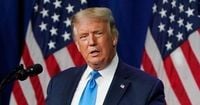Donald Trump, the American president, is facing historically low approval ratings as he marks the first 100 days of his second term in office. A recent CNN/SSRS poll indicates that his approval rating has plummeted to just 41%, the lowest for any U.S. president at this stage since Dwight D. Eisenhower. This marks a significant decline compared to his first term, where he had higher initial ratings.
Since March, Trump's approval has decreased by 4 points and by 7 points since February. The poll reveals that only 22% of Americans believe he is managing diplomatic relations effectively, while a larger portion, 45%, express disapproval of his approach. This trend is particularly concerning among women and Spanish-speaking voters, with support among independents dropping to 31%, a level comparable to the lowest points of his first term.
The discontent among the public is largely linked to Trump's handling of key issues such as the economy, inflation, and the overall management of the state. His approval rating regarding economic management has fallen 5 points to a low of 39%, with 52% of respondents disapproving of his economic policies, a notable decrease of 13 points since December. Furthermore, only 35% approve of his handling of inflation, down 9 points, and similarly, his approval rating concerning citizens' welfare has decreased by 4 points, also landing at 35%.
In terms of foreign policy, Trump's approval stands at 42%, while disapproval has surged to 46%. A significant 57% of Americans believe that Trump's approach is steering the country in the wrong direction. Concerns have been raised about his increasingly friendly stance towards Russia and his management of foreign threats, which have garnered approval from only 39% of respondents.
Interestingly, Trump has seen a majority approval rating (51%) only on issues related to gender identity and transgender rights, a stance that enjoys overwhelming support among Republicans (90%) but is met with skepticism from independents (48%). Conversely, a striking 64% of Americans view his interventions in cultural affairs negatively, particularly his attempts to exert control over institutions like the Kennedy Center and the Smithsonian, initiatives he has assigned to Vice President Tzei Nti Vans.
As public trust in Trump's use of presidential power wanes, only 46% believe he is using it responsibly, and just 50% feel he is providing effective leadership. These numbers reflect a significant decline since December, indicating growing skepticism about his presidency. Many citizens have voiced concerns regarding his flurry of executive orders, questioning whether many of these can withstand judicial scrutiny.
Despite the low approval ratings, 52% of Americans believe that Trump's second term will fundamentally change the country. However, only 28% think he has begun to effectively address the nation's pressing issues. A Trump supporter from New Mexico articulated this sentiment, stating, "He does what he promised. I might choose a different approach, but you know, it's Donald Trump – he will do what he wants." This reflects the divided opinions on his leadership and policy decisions.
As Trump navigates these turbulent waters, his administration is left grappling with the reality of a discontented electorate. The challenges he faces are not just political but also deeply personal, as public perception shifts and the expectations of the American people evolve. The coming months will be crucial for Trump as he attempts to regain the trust of voters and steer his presidency towards a more favorable direction.
In summary, Trump's second term is off to a rocky start, with approval ratings that suggest a significant disconnect between his policies and the sentiments of the American public. As the political landscape continues to shift, the question remains: Can he adapt and recover from these historically low numbers, or will he further alienate the electorate?




